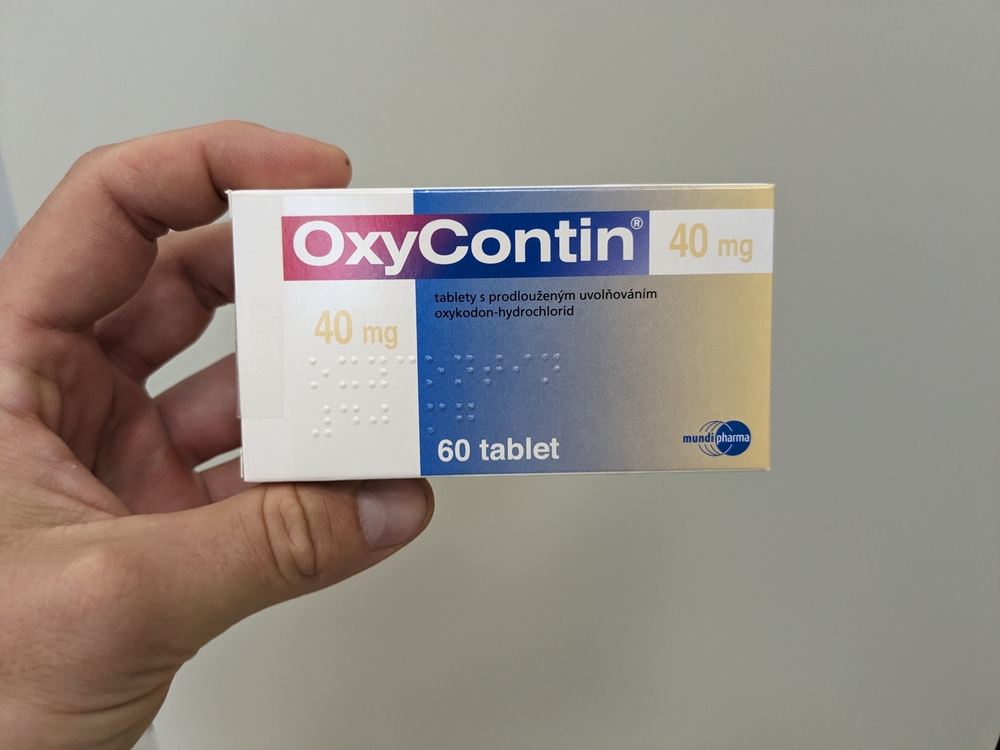Last Updated:
May 16th, 2025
Oxycontin Addiction | Symptoms, Effects and Causes
What is Oxycontin?
Oxycontin is a powerful opioid medication prescribed to relieve severe and ongoing pain. It’s most commonly given to people recovering from surgery, living with advanced cancer or managing chronic pain that hasn’t responded to other treatments.
When used as directed by a medical professional, Oxycontin can provide much-needed relief, helping someone get through incredibly tough periods in their life. But despite being a prescription medication, it comes with a significant risk: dependency.
Oxycontin contains oxycodone, which affects the brain’s perception of pain. It’s this effect on the brain that makes it both helpful and potentially harmful.

Is Oxycontin addictive?
It can be difficult to come to terms with the idea that a drug meant to help you could be addictive. After all, Oxycontin is handed out in hospitals and pharmacies, not dark alleys. But that’s part of the problem. Because it’s packaged with a label and dosage instructions, it can feel safe.
While it is safe when used correctly and for short periods, Oxycontin’s potency and the way it affects the brain can lead to addiction more easily than many people realise.
Oxycontin triggers the release of feel-good chemicals in the brain. It calms the nervous system, reduces pain and creates a sense of relief or even euphoria. Over time, the brain can start to crave that feeling, and if the drug is taken for longer than prescribed or in higher doses, dependency can form.
For many, the line between following a prescription and developing an addiction isn’t always clear, and by the time it is, the grip of the drug has already taken hold.
How can a person become addicted to Oxycontin?
With a drug as strong as Oxycontin, it’s understandable that recreational use can lead to addiction. But that’s far from the only path. Many people who end up struggling with Oxycontin addiction didn’t set out to misuse it. They started by following their doctor’s instructions, taking it for genuine pain relief and slowly building a tolerance. What started as healing turned into something else entirely.
Here are a few common ways people can become addicted to Oxycontin:
- Prolonged prescription use: Taking Oxycontin for an extended period, even under a doctor’s care, can lead to physical dependence and, eventually, addiction.
- Increasing the dose without medical advice: As the body builds tolerance, some may take more than prescribed in an attempt to get the same pain relief or sense of calm.
- Using someone else’s prescription: Borrowing pills from a friend or family member, even just to “take the edge off,” can begin a pattern of misuse.
- Using it for emotional relief: Some begin taking Oxycontin to cope with anxiety, stress or emotional pain, not just physical discomfort.
- Experimentation or recreational use: In some cases, people take it out of curiosity or for a high, not realising how quickly addiction can develop.
What are the signs of Oxycontin addiction?
If you or a loved one has been prescribed Oxycontin, it’s essential to keep an eye out for early warning signs. The earlier you spot them, the sooner help can be sought and the greater the chances of recovery. Addiction can affect the body, mind and behaviour in ways that may seem subtle at first, but they often grow more noticeable over time.
Physical signs:
- Constant drowsiness or fatigue
- Slurred speech or noticeably slowed breathing
- Constricted (tiny) pupils, even in dim lighting
- Experiencing frequent flu-like symptoms, especially when not taking the drug
- Weight loss or changes in appetite
Psychological signs:
- Feeling anxious or agitated when the drug isn’t available
- Mood swings or emotional numbness
- Difficulty concentrating or memory problems
- Cravings or obsessive thoughts about taking the next dose
- Depression, especially in between uses
Behavioural signs:
- Visiting multiple doctors to obtain new prescriptions (known as “doctor shopping”)
- Isolating from friends or family
- Neglecting responsibilities at work, home or school
- Hiding or lying about drug use
- Running out of medication early or taking it in secret
Spotting a combination of these signs may indicate that Oxycontin use has crossed into addiction. But even just a few of them can signal that it’s time to take a closer look.
How do I know if I have an Oxycontin addiction?
Addiction doesn’t always announce itself loudly. It can develop in the background, quietly changing how you think and feel until life suddenly revolves around a pill bottle. That’s why it’s so important to check in with yourself regularly, especially if you’ve been prescribed Oxycontin for any length of time.
Ask yourself the following questions. If you answer “yes” to one or more, it could be a sign that help is needed:
- Do I feel anxious or irritable when I don’t take Oxycontin?
- Have I increased my dose without speaking to my doctor?
- Am I taking Oxycontin for reasons other than pain, like stress or sadness?
- Do I find myself planning my day around when I can take my next dose?
- Have loved ones expressed concern about my use of painkillers?
- Have I ever lied about how much Oxycontin I’m taking or tried to hide it?

How can I get help for an Oxycontin addiction?
Recovering from Oxycontin addiction is possible, and it begins with the right support. The rehab process is designed to guide you through each stage of recovery, from the first step of detox to long-term healing.
Detox is the first phase, where the body clears itself of the drug. Because opioid withdrawal presents difficult withdrawal symptoms, it’s best done in a supportive environment. In a rehab setting, you’ll be looked after and kept as comfortable as possible while your system adjusts.
Therapy comes next. This includes one-to-one counselling, where you can talk through what led to the addiction and start rebuilding your emotional resilience. Other therapies like CBT (cognitive behavioural therapy) and DBT (dialectical behavioural therapy) help reshape negative thought patterns, while holistic treatments like yoga, art and meditation help you reconnect with your body and mind in a healthy way.
Aftercare is crucial. Addiction recovery doesn’t end when the programme does. It provides ongoing support through regular check-ins and counselling that helps you stay on track and continue moving forward.
What are the next steps?
If you’re worried about Oxycontin addiction, whether it’s your own or someone else’s, Addiction Helper is here to support you. We work with trusted rehab centres across the UK and can help you find the right programme based on your needs. From the first phone call to long after treatment ends, we’re here to walk beside you every step of the way.
Reach out to Addiction Helper today and take the first step towards lasting recovery.
Our compassionate team are ready and available to take your call, and guide you towards lasting the lasting addiction recovery you deserve.

